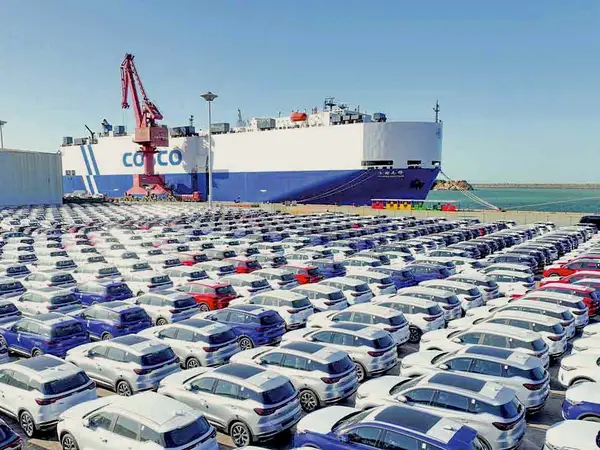Iran said Sunday that the first shipment of Chinese cars is about to hit the market while the minister responsible for the country's car industry was impeached over his lackadaisical performance.
According to reports, the shipment was unloaded at Aprin dry port -- an inland intermodal terminal near Tehran directly connected by road or rail to a seaport. This shipment includes 1,108 Changan CS35s and 125 Changan CS55s imported by Iranian automaker Saipa.
Mehdi Zeighami, the director of the car import plan at the Ministry of Industry, Mine and Trade, said on Sunday that the import was finally carried out “after a five-year hiatus.” He did not say if this is anyhow related to the impeachment of Industry Minister Reza Fatemi-Amin, who appeared at the parliament on the same day to defend his ministry’s performance about the car industry. Even if it was a publicity stunt by the ministry, it did not prove to be effective as Fatemi-Amin could not convince the lawmakers and was sacked anyway.
There are a couple of noteworthy points about the plan to import the cars from the Chinese company. The government plans to import about 100,000 cars from one single Chinese state-owned company, Changan Automobile, by the end of the current Iranian year – March 20, 2024. And the entire project will be done by Saipa, one of the Iranian state-owned companies with a monopoly in manufacturing automobiles. The fact that there is no competition in the import project as no businesses can take part in it makes the whole affair more prone to corruption.
For years critics and politicians have criticized the government-controlled auto industry and have referred to a “mafia” running the money-losing and inefficient sector. In 2019, it was revealed that these carmakers owed $9 billion, a considerable sum in Iran, due to corruption and mismanagement. "Widespread financial corruption has turned automakers in Iran into a powerful Mafia," a lawmaker said at the time.
The carmakers are unable to satisfy domestic demand and they keep raising prices. The government has long restricted car imports, turning the country into a vast parking lot of dilapidated cars.
Changan Automobile is the smallest of the "Big Four" state-owned car manufacturers in China with an annual production capacity of about two million units. It is not clear how the Iranian government came to the conclusion to choose this particular company or if the company would be able to supply the promised 100,000 cars in addition to its other supply commitments.
Another crucial question is how Iran is planning to pay for 100,000 cars when it is under US banking sanctions. The answer can be simple: Use oil import money China owes in a cars for fuel barter deal.
First, making people so eager to get one of the long-sought-after imported cars that they sign up for the plan and pay in advance for a nebulous purchase; second, a murky contract between two state-owned companies from Iran and China without providing any details about the total amount of transactions and number of cars; third, cashing on people’s money as the price of cars can be updated and increased with every shipment of cars. The whole affair can easily be a method by the regime, which faces difficulties to access its oil revenues, to barter oil for cars with China and get the money from the nation.
According to Zeighami, the final price of the imported cars will be announced in the coming weeks. The Central Bank of Iran has blocked at least 96 trillion rials ($2 billion) of prospective customer's money in the cars pre-sales scheme without determining the models of the cars, availability, or the final price since early March. Prospective buyers had to deposit at least five billion rials ($10,000) to book the purchase of an imported car and over 120,000 people signed up for the plan.
Now it is apparent that most of the cars will be Changans, although Zeighami claims that 1,500 other cars will also be imported,which will be from other carmakers such as Fiat, Hyundai, Kia and Mitsubishi.
A lawmaker representing Tehran, Somayeh Rafiei, said in a TV show last week that the axed industry minister told her that the total demand for cars in the country is about two million units.
Iran’s two main carmakers – Saipa and Iran Khodro – can only produce 1,400,000 units of light and heavy vehicles, mostly sub-standard older foreign models.
The chairman of the Association of Car Scrapping Centers said last week that currently 14 to 15 million junk vehicles are on the roads, consuming at least 33 million liters of gasoline (8.7 million gallons) a day.
All things considered, the entire car import scheme and the impeachment of the minister seems like a cunning plot by the government.
